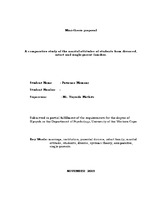| dc.contributor.advisor | Mathiti, Vuyisile | |
| dc.contributor.author | Memani, Patience Sandiswa | |
| dc.contributor.other | Dept. of Psychology | |
| dc.contributor.other | Faculty of Community and Health Sciences | |
| dc.date.accessioned | 2013-05-27T10:30:43Z | |
| dc.date.available | 2007/03/16 08:24 | |
| dc.date.available | 2007/03/30 | |
| dc.date.available | 2013-05-27T10:30:43Z | |
| dc.date.issued | 2003 | |
| dc.identifier.uri | http://hdl.handle.net/11394/238 | |
| dc.description | Magister Psychologiae - MPsych | en_US |
| dc.description.abstract | The aim of the research study was to examine the marital attitudes of students from divorced, intact and single parent families. Most of these students were in the intimacy versus isolation developmental phase. During this phase young adults seek to form an intimate relationship with another person, but may fear intimacy or may not want to give up their independence and may experience loneliness and isolation instead. It was thus important to conduct the study since some of the students were at a developmental stage in which they might have been dealing with intimate relationship issues. Given the focus of international studies on the marital attitudes of students from intact and divorced families, it was considered important to include, in the comparison, students from single parent families. A survey research design was used as a broad methodological framework and Bowen's family systems theory was used as a theoretical framework. A convenient sampling method was used to select a sample of 209 participants from the Community and Health Science Faculty. A Marital Attitude Scale and a questionnaire was used to collect data. The data was analyzed by means of basic descriptive statistics, the Kruskal-Wallis H-test, T-Test and Mann Whitney U-Test. Results showed that students’ parental marital status (married, divorced, single) had no influence on their attitudes towards marriage. Generally, the students showed positive attitudes towardsmarriage. The results showed that there was a statistically significant difference among different racial groups. The results suggest that except for race, there was no statistically significant difference on the marital attitudes when compared on such variables as gender, religion and age. Although the marital attitudes of participants were generally positive among the different racial groups, participants from the Black community had less positive marital attitudes when compared with their Coloured, Indian and White counterparts. Participants from the Coloured community also had less positive marital attitudes when compared to their counterparts from the Indian and White communities. The results of this study show that participants had relative positive attitudes towards marriage and that these attitudes did not differ according to parental status. | en_US |
| dc.language.iso | en | en_US |
| dc.publisher | University of the Western Cape | en_US |
| dc.subject | Adult children of divorce | en_US |
| dc.subject | South Africa Western Cape | en_US |
| dc.subject | Psychology | en_US |
| dc.subject | Divorce | en_US |
| dc.subject | Psychological aspects | en_US |
| dc.title | A comparative study of the marital attitudes of students from divorced, intact and single-parent families | en_US |
| dc.type | Thesis | en_US |
| dc.rights.holder | University of the Western Cape | en_US |
| dc.description.country | South Africa | |

